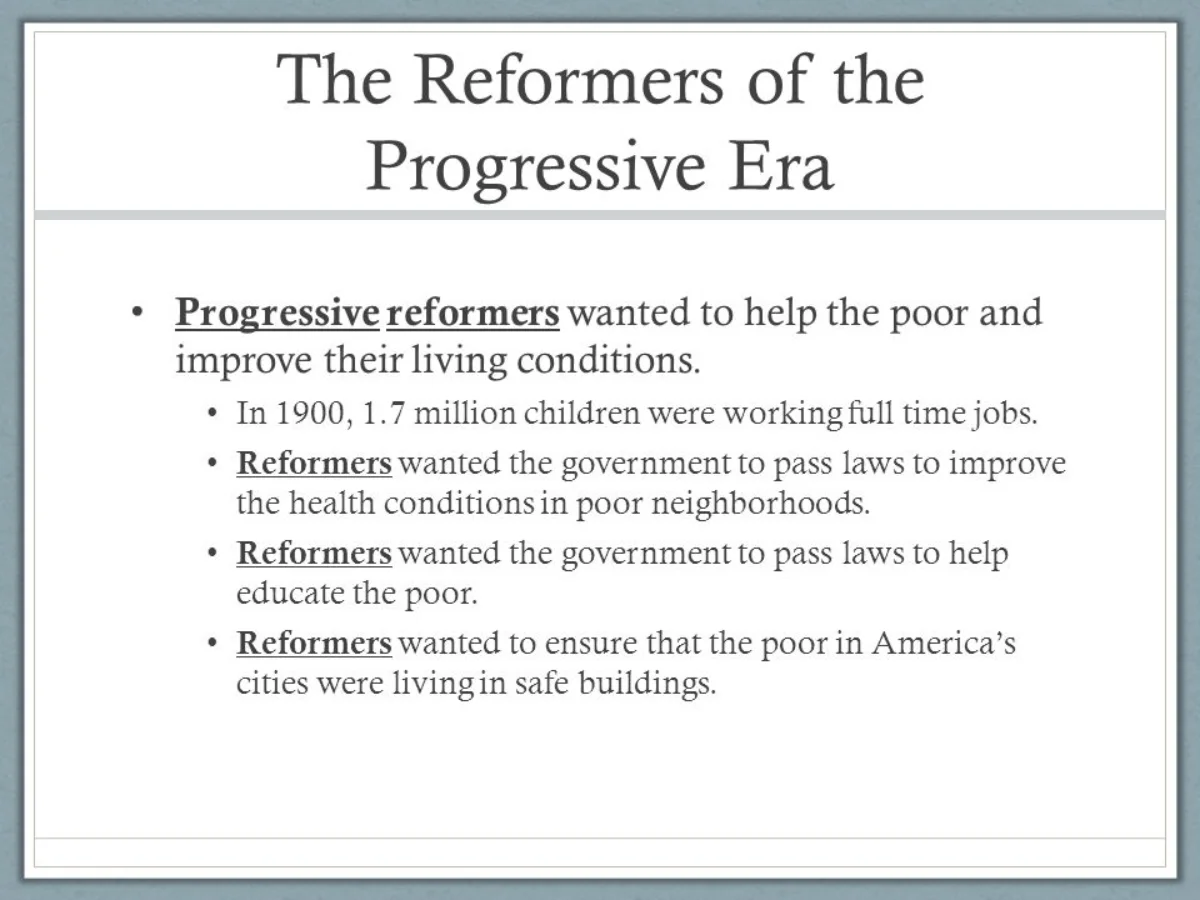The Progressive Era in the United States, spanning roughly from the late 19th century to the early 20th century, was a time of significant social, political, and economic change. Progressive reformers, a diverse group of activists and leaders, worked tirelessly to address various issues plaguing American society. In this article, we’ll delve into the most impressive achievements of Progressive reformers, highlighting their enduring impact on the nation.
Setting the Stage for Progressive Reform
Understanding the Progressive Era
Before we explore their achievements, let’s understand the context of the Progressive Era. This period was characterized by rapid industrialization, urbanization, and social inequality. Progressive reformers believed in the government’s role in addressing these challenges and improving the lives of ordinary Americans.
Impressive Achievements of Progressive Reformers
1. Women’s Suffrage (19th Amendment)
One of the most groundbreaking achievements of the Progressive Era was the ratification of the 19th Amendment in 1920, granting women the right to vote. Progressive activists like Susan B. Anthony and Elizabeth Cady Stanton had long championed women’s suffrage, and their efforts finally paid off. This achievement paved the way for increased gender equality and participation in the democratic process.
2. Child Labor Laws
Progressive reformers recognized the harsh working conditions and exploitation faced by children in factories and mines. Through advocacy and lobbying, they successfully pushed for the passage of child labor laws, limiting the hours and conditions under which children could work. This marked a significant step toward protecting the welfare of young workers.
3. Pure Food and Drug Act
The publication of Upton Sinclair’s “The Jungle” exposed the unsanitary conditions in the meatpacking industry. Progressive reformers, in response, championed the Pure Food and Drug Act of 1906. This legislation aimed to ensure the safety and quality of food and medicines, laying the foundation for modern food safety regulations.
4. Anti-Trust Laws
Progressives recognized the growing power of big corporations and monopolies, which often exploited consumers and stifled competition. Laws such as the Sherman Antitrust Act and the Clayton Antitrust Act were passed to promote fair competition and prevent monopolistic practices. These laws continue to influence modern antitrust enforcement.
5. Environmental Conservation
Progressive reformers were also instrumental in the early conservation movement. President Theodore Roosevelt, a prominent Progressive, established national parks, forests, and monuments, laying the groundwork for the preservation of America’s natural treasures. This legacy endures today with the National Park System.
6. Direct Election of Senators (17th Amendment)
Before the 17th Amendment’s passage in 1913, U.S. Senators were chosen by state legislatures. Progressive reformers advocated for the direct election of senators by the people, enhancing democracy and reducing political corruption.
7. Labor Reforms
Progressive reformers were instrumental in advocating for workers’ rights. Achievements included safer working conditions, the establishment of the eight-hour workday, and the right to form labor unions and engage in collective bargaining.
8. Social Welfare Programs
The Progressive Era also saw the emergence of social welfare programs aimed at assisting vulnerable populations. Pioneering efforts laid the foundation for the later development of programs like Social Security and Medicare.
9. Muckraking Journalism
Progressive reformers supported investigative journalism, known as muckraking, which exposed corruption and social issues. The work of journalists like Ida Tarbell and Lincoln Steffens led to public awareness and demanded reforms.
10. Temperance Movement (Prohibition)
While Prohibition had mixed results, it was a significant achievement of the Progressive Era. The 18th Amendment, ratified in 1919, prohibited the sale, manufacture, and transportation of alcoholic beverages. It reflected the Progressive belief in social and moral reform.
Conclusion
The Progressive Era was a time of remarkable change and reform in the United States. The achievements of Progressive reformers left a lasting legacy that continues to shape the nation today. From women’s suffrage to labor reforms, from environmental conservation to social welfare programs, these impressive accomplishments demonstrate the power of dedicated individuals and the impact of collective action.
As we reflect on the accomplishments of the Progressive Era, it’s essential to recognize that the work of reform is ongoing. While significant progress has been made, there are always new challenges to address and injustices to rectify. The spirit of the Progressive reformers serves as an enduring inspiration for those who seek to create a more just and equitable society.
FAQs (Frequently Asked Questions)
1. What was the Progressive Era in American history?
The Progressive Era was a period of social, political, and economic reform in the United States, spanning from the late 19th century to the early 20th century. It aimed to address issues such as corruption, inequality, and social injustice.
2. Who were some prominent Progressive reformers?
Prominent Progressive reformers included Susan B. Anthony, Elizabeth Cady Stanton, Theodore Roosevelt, Upton Sinclair, and Ida Tarbell, among others.
3. How did Progressive reformers contribute to women’s suffrage?
Progressive reformers played a crucial role in advocating for women’s suffrage, leading to the ratification of the 19th Amendment in 1920.
4. What impact did Progressive reformers have on labor rights?
Progressive reformers advocated for labor rights, leading to reforms such as safer working conditions, the eight-hour workday, and the right to form labor unions.
5. What is the legacy of the Progressive Era in modern America?
The legacy of the Progressive Era includes women’s suffrage, environmental conservation, antitrust laws, social welfare programs, and the direct election of senators, among other achievements. These reforms continue to influence American society and politics.
Read more: https://www.rozyjos.com/
More Related:
Does Progressive Report to Carfax?
Do Small Accidents Get Reported to Carfax?
How to Convert Progressive Prescription to Computer Glasses
Exploring Alternatives to Progressive Lenses: A Comprehensive Guide
Unveiling the Exclusive Benefits of Progressive Emerald Level Membership
Who is the Major Shareholder of Progressive Insurance?
Drop Set vs. Progressive Overload: Which is Better for Muscle Growth?

